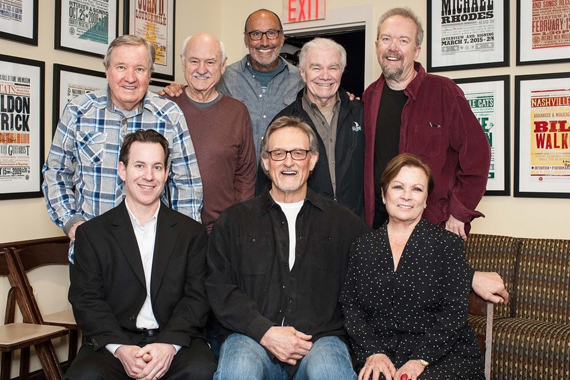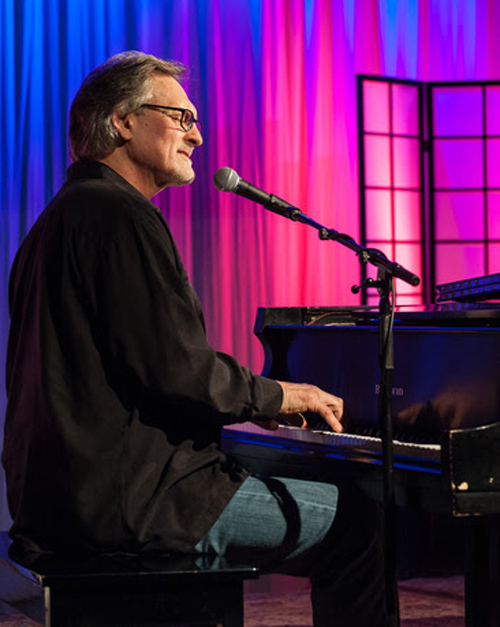

Pictured (L-R): (back) former Poets and Prophets honorees Buzz Cason, Sonny Curtis, Mark D. Sanders, Dickey Lee, and Don Schlitz; (front): the Country Music Hall of Fame and Museum’s Michael Gray, honoree Mike Reid, and songwriter Sharon Vaughn. Photo: Carissa Riccardi
Nashville Songwriter Hall of Famer Mike Reid was the focus of the Country Music Hall of Fame’s Poets & Prophets series on Saturday, March 4. This year marks the 10th anniversary of the series, which recognized previous Poets & Prophets in the audience: Sonny Curtis, Buzz Cason, Dickey Lee, Mark D. Sanders and Don Schlitz.
With over a dozen No. 1s, Reid’s “I Can’t Make You Love Me” was inducted into the Grammy Hall of Fame in its first year of eligibility this year.
Reid performed the Bonnie Raitt title among three others, including Tim McGraw’s No. 1 “Everywhere,” Ronnie Milsap’s 1983 hit “Stranger In My House,” and a title he said is as closely autobiographical as it can be, “More Life,” recorded by Randy Travis and Don Henley for Travis’ 25th Anniversary Collection.
A football fullback in high school outside of Juniata Gap, Pennsylvania, the lively Reid took the hall’s audience—rolling with laughter—through a five-season NFL career with the Cincinnati Bangles to eventually land in Nashville.
A middle child of three boys, Reid filed through Penn State as a history major, business major, and finally landed as a music major. Despite having few influences in music from his youth, he grew up hearing hymns in church and practicing from the age of six on his paternal grandmother’s beat-up piano. Songwriting didn’t come to the artist until he was in his mid-20s.
“I had no gifts or natural abilities in music,” said Reid. “[My gifts] were in sports. But the music was something that got in there. I just enjoyed trying things. Fortunately, my [college] coach Joe Paterno loved that he had a guy on the team that majored in music.”
Reid commented on the wear sports took on his body, and music’s constant pull. He noted the ’70s was a different time, having signed his NFL contract for only $22,000, which was double what he noted his father may have made in a year, but far less than today’s football contracts.
“It’s not all that long ago I realized sports was something I wanted to do, but I remember wanting to be a writer,” recalls Reid. “There was no discernible talent in me, but I do think following your heart sometimes requires overcoming common sense.”
After leaving the NFL, Reid’s early music career consisted of playing album covers and original songs at listening rooms around the country. He focused on comedic talents inspired from Steve Goodman to entertain a room.
“I remember back then thinking the one thing that comes close to equaling the beauty of music is a room full of people laughing,” recalled Reid. “So I tried to mix in the silliness with songs and figure out a set to engage people.”
A move from Cincinnati to Nashville in 1980 for a publishing deal with Gerry Teifer at ATV paid $100/week but Reid was dropped after a year and a half. Disheartened Reid met with Milsap’s producer Rob Galbraith.
“I walked in to Rob’s office that day feeling like Jimmy the Greek, and I walked out feeling like Jimmy Webb,” said Reid. “That one day he made me feel like a songwriter. Four months later we had a couple things on the next Milsap record.”

Mike Reid
A record deal came in the ’90s with Columbia. Despite the No. 1 success of “Walk on Faith,” Reid felt dissonance.
“I’d be out in my bunk and think of Matt, Cait, Susie, and it was selfish on my part,” recalled Reid of young fans throwing themselves at him. “I thought, ‘Buddy, you’re lost enough, you start wondering down this road you’re about to never make it out of here.’ I gave it a shot, out on the road for a couple years, but it wasn’t in the heart of me.”
Around that time, Reid wrote “I Can’t Make You Love Me,” with Allen Shamblin after hearing a news report quoting a down-and-out man. “We wrote that song as an uptempo, bluegrass country song intended for Ricky Skaggs. Two lines laid around for six months but fortunately we couldn’t get any more than that.
“One day a couple words came to me, and I thought, ‘I wonder if this is related to those lines.’ So I called Allen and we dug in. I remembered thinking there were only three places this song could go: Bonnie Raitt, Linda Rondstadt or Bette Midler. Since I had a cut on Bonnie’s Nick Of Time record, it went to her first because I had her address.”
Forthcoming songwriter events celebrating the Hall’s 50th anniversary include April 1 with Curtis at 11:30 a.m. before a round with Cason, Lee, Dallas Frazier and Dan Penn at 2 p.m. A Tin Pan South round at 3rd & Lindsley with Sanders, Matraca Berg, Bobby Braddock and Roger Cook and another with Al Anderson, Tom Douglas, Roger Murrah and Gretchen Peters.
Jimmy Webb and Sharon Vaughn are the next songwriters planned for the Poets & Prophets in the Ford Theater: April 29 and August 5, respectively.

Category: Featured, Publishing
About the Author
Eric T. Parker oversees operations and contributes editorial for MusicRow's print magazine, MusicRow.com, the RowFax tip sheet and the MusicRow CountryBreakout chart. He also facilitates annual events for the enterprise, including MusicRow Awards, CountryBreakout Awards and the Rising Women on the Row. eparker@musicrow.com | @EricTParkerView Author Profile


